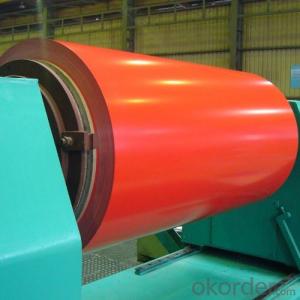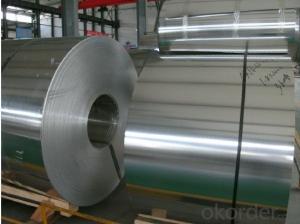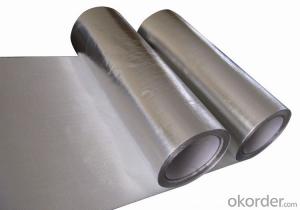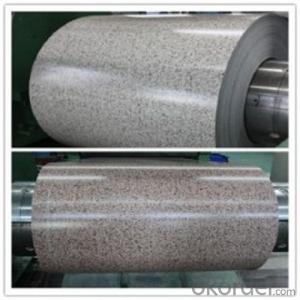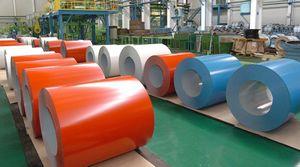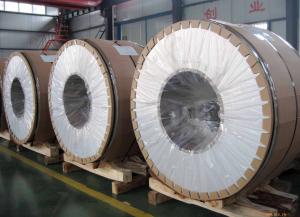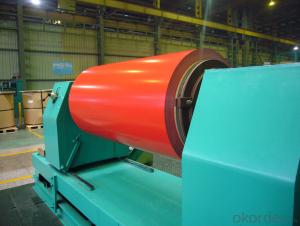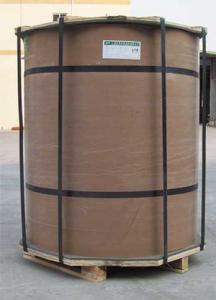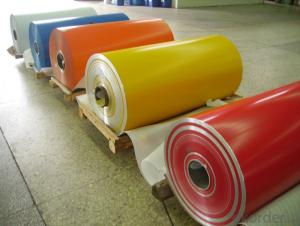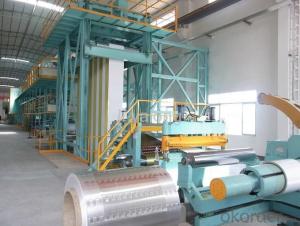China 3003 PVDF Coated Aluminum Coil-3XXX
- Loading Port:
- China Main Port
- Payment Terms:
- TT OR LC
- Min Order Qty:
- -
- Supply Capability:
- -
OKorder Service Pledge
OKorder Financial Service
You Might Also Like
Product Description:
1 Specifications of PVDF Coated Aluminum Coil/Sheet
Alloy | AA1050,AA1060, AA1070, AA1100, AA3003, AA3004, AA3005, AA3105, AA5005, AA5052, AA5754, AA5083, AA8011 |
Temper: | H12, H14, H16, H18, H22, H24, H26, H32,HO, F |
Thickness: | 0.10-4.0mm |
Width: | 10mm- 2000mm |
Coating | PVDF |
Painting Thickness | Standard 16-25 microns, max 40 microns |
Color | Acording to Ral colors or customer’s samples |
Standard: | GB/T17748-1999, ASTM, ISO, EU standard |
Special Specification is available on customer’s requirement | |
PVDF(fluorine-carbon) Coating
PVDF(fluorine-carbon) coating :made of fluorine carbon resin, pigment, ester solvent, after high temperature roasting and baking, the paint is solidified to dry film with super weather resistance. PVDF coating also can be classified as traditional PVDF and nanometer PVDF coating.
A.Traditional PVDF Coating, with KYNAR500 PVDF, two or three times for coating and baking, has good properties of anti-acid, anti-alkali and is durable in atrocious weather and environment, keeping 15 years no unwonted fading. In view of these facts, we recommend this panel applied for external wall cladding.
B.Nanometer PVDF Coating, which different with traditional PVDF is the clear coating. It contains nanometer element, which can protect panel from pollution, Because nanometer has self-cleaning effect, It easy to get rid of dust and pollution by raining or water.
- Q: May anyone tell me what's the product when hydrochloric acid reacts with aluminum?HCl + Al → ?
- you may separate the hydrogen by electrolysis. purely take your tube of gas and place the tube face down in salt water. Then get yet another attempt tube and fill it halfway with salt water. The salt interior the water helps the water to grow to be a greater powerful conductor it is by the fact NaCl is an ion. This ionizes the water and helps conduction. Then after installation the attempt tubes, get a batter and connect it to a dazzling and unfavourable plate with the corresponding terminals on the battery. Then turn on the battery. The water ought to separate out of the tube, leaving the hydrogen. the different tube with be crammed with all the water. to answer your 2d question.... The gas that would want again out to be hydrogen. 6HCl + 2Al = 2AlCl3 + 3H2(gas)
- Q: What are the potential drawbacks or limitations of using aluminum coils?
- Using aluminum coils has several potential drawbacks and limitations. Firstly, aluminum is a softer metal compared to materials like copper or steel, making the coils more susceptible to damage such as denting or bending, especially in high-impact environments. Additionally, aluminum is prone to corrosion, especially in harsh or corrosive surroundings, which can negatively affect the coils' performance and lifespan. Another limitation of aluminum coils is their lower thermal conductivity in comparison to copper coils. This means that aluminum coils may not transfer heat as efficiently, resulting in decreased cooling or heating performance in certain applications. Moreover, the lower thermal conductivity may lead to higher energy consumption as the system needs to work harder to achieve the desired temperature. Furthermore, when aluminum coils are used in HVAC systems, compatibility issues can arise with specific refrigerants. Aluminum can react with certain refrigerants, causing corrosion or other chemical reactions that could compromise the coils' performance and longevity. Therefore, careful consideration and compatibility testing are necessary when selecting a refrigerant to use with aluminum coils. Lastly, the cost of aluminum coils can be higher compared to other coil materials. Although aluminum itself is relatively inexpensive, the manufacturing process for aluminum coils can be more complex and costly, impacting the overall product cost. Despite these drawbacks, aluminum coils are still widely utilized in various industries due to their lightweight nature, good electrical conductivity, and resistance to certain types of corrosion. However, it is crucial to thoroughly evaluate the specific application, environment, and requirements before choosing aluminum coils to ensure they are the most suitable option.
- Q: How are aluminum coils protected during shipping?
- Aluminum coils are typically protected during shipping by being wrapped in a layer of protective film or paper, secured with strapping or bands, and then placed on pallets or in crates. Additionally, they may be enclosed in metal or wooden containers to provide further protection against external damage during transit.
- Q: Explain the relationship between aluminum coil and aluminum alloy in a few sentences.
- <p>Aluminum coil and aluminum alloy are related in that aluminum coil can be made from aluminum alloy. An aluminum alloy is a material composed of aluminum and other metallic or non-metallic elements, which are mixed to enhance its properties. Aluminum coils are long, rolled sheets of aluminum that can be made from various types of aluminum, including alloys. The use of an alloy allows for the creation of aluminum coils with specific characteristics, such as increased strength, corrosion resistance, or formability, depending on the application requirements. Thus, aluminum coils are often manufactured from aluminum alloys to meet the demands of diverse industries.</p>
- Q: What are the electrical conductivity properties of aluminum coils?
- Aluminum coils have excellent electrical conductivity properties. Aluminum is a highly conductive metal, second only to copper. It possesses low resistivity and can effectively carry electrical current, making it a preferred choice for various electrical applications such as power transmission, wiring, and electrical coil windings.
- Q: Can aluminum coils be used for automotive heat shields?
- Automotive heat shields can indeed utilize aluminum coils. Aluminum, known for its outstanding thermal conductivity and high melting point, is frequently employed as a heat shield material. Its lightweight nature and remarkable resistance to corrosion make it particularly well-suited for automotive purposes. By effortlessly molding aluminum coils into the desired configuration, effective heat insulation can be attained, safeguarding delicate components from the engine or exhaust system's excessive heat. Moreover, aluminum is cost-efficient and easily accessible, contributing to its widespread preference as an automotive heat shield material.
- Q: Are there any restrictions on the export or import of aluminum coils?
- Yes, there are restrictions on the export or import of aluminum coils. These restrictions can vary from country to country and are typically imposed to protect domestic industries, ensure national security, or comply with international trade agreements. Governments may impose import or export duties, quotas, licensing requirements, or impose restrictions on certain countries for political or economic reasons. It is important to consult the specific regulations and trade policies of the countries involved to understand the exact restrictions in place.
- Q: What are the different coil handling equipment options for aluminum coils?
- Some different coil handling equipment options for aluminum coils include coil lifters, coil tilters, coil cars, and coil upenders. These equipment options are designed to safely handle and transport aluminum coils in various industrial applications.
- Q: Which would you guys recommend to a 13 year-old? I used a wooden bat at my last game, and I got a double to the left field wall, I don't think i've done that good with an aluminum bat all year. Should I continue using the wooden one? What do you guys think?
- I would say aluminum bats would hit a baseball farther than a wooden one. Take this analogy for example, try throwing a baseball at the same speed against a tree, and then throw it the same speed against a car. Which one will travel farther? Also, I think they don't allow players in the major leagues to use aluminum bats because they could literally kill people at the velocity at which the ball is being struck at. Especially the people around the left and right foul line where the seats come close to the field.
- Q: Are aluminum coils resistant to moisture?
- Yes, aluminum coils are highly resistant to moisture. Aluminum has a natural oxide layer that forms on its surface, which acts as a protective barrier against moisture and prevents corrosion. This makes aluminum coils an excellent choice for applications where exposure to moisture is a concern, such as in HVAC systems or outdoor equipment.
Send your message to us
China 3003 PVDF Coated Aluminum Coil-3XXX
- Loading Port:
- China Main Port
- Payment Terms:
- TT OR LC
- Min Order Qty:
- -
- Supply Capability:
- -
OKorder Service Pledge
OKorder Financial Service
Similar products
Hot products
Hot Searches
Related keywords
